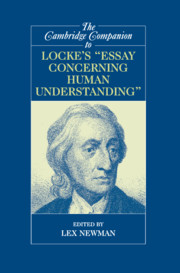Book contents
- Frontmatter
- Introduction
- 1 The Intellectual Setting and Aims of the Essay
- 2 Locke’s Polemic against Nativism
- 3 The Taxonomy of Ideas in Locke’s Essay
- 4 Locke’s Distinctions between Primary and Secondary Qualities
- 5 Power in Locke’s Essay
- 6 Locke on Substance
- 7 Locke on Ideas of Identity and Diversity
- 8 Locke on Ideas and Representation
- 9 Locke on Essences and Classification
- 10 Language, Meaning, and Mind in Locke’s Essay
- 11 Locke on Knowledge
- 12 Locke’s Ontology
- 13 The Moral Epistemology of Locke’s Essay
- 14 Locke on Judgment
- 15 Locke on Faith and Reason
- Bibliography
- Index of Names and Subjects
- Index of Passages Cited
4 - Locke’s Distinctions between Primary and Secondary Qualities
Published online by Cambridge University Press: 28 July 2007
- Frontmatter
- Introduction
- 1 The Intellectual Setting and Aims of the Essay
- 2 Locke’s Polemic against Nativism
- 3 The Taxonomy of Ideas in Locke’s Essay
- 4 Locke’s Distinctions between Primary and Secondary Qualities
- 5 Power in Locke’s Essay
- 6 Locke on Substance
- 7 Locke on Ideas of Identity and Diversity
- 8 Locke on Ideas and Representation
- 9 Locke on Essences and Classification
- 10 Language, Meaning, and Mind in Locke’s Essay
- 11 Locke on Knowledge
- 12 Locke’s Ontology
- 13 The Moral Epistemology of Locke’s Essay
- 14 Locke on Judgment
- 15 Locke on Faith and Reason
- Bibliography
- Index of Names and Subjects
- Index of Passages Cited
Summary
Is there a distinction between primary and secondary qualities? The question may rest on a confusion. It is not obvious that it would be raised if the questioner knew what he meant by 'primary' and 'secondary' qualities.
There is at least this distinction. We may distinguish between the basic explanatory features of things and the derivative features they explain. In the disciplines that gave rise to chemistry, there's a long tradition of calling the fundamental explanatory qualities or principles 'firsts' (Baeumker 1909; Maier 1968: 17-18; Anstey 2000: 20-30). Aristotle's “first qualities” are hot, cold, dry, and wet; Paracelsus's tria prima ('three firsts') are salt, sulphur, and mercury. Boyle was willing to follow Aristotelian usage in calling hot, cold, dry, and wet 'first qualities'; he called what he considered to be the more fundamental attributes of size, shape, motion, and rest “Primary Modes of the parts of Matter, since from these simple Attributes or Primordiall Affections all the Qualities are deriv'd” (Boyle [1670] 1999: 6.267).
If Locke were only interested in advocating mechanistic physics, his discussion of primary and secondary qualities would be of marginal interest. Long before the publication of An Essay concerning Human Understanding, Boyle offers a defense of the thesis that ‘‘allmost all sorts of Qualities . . .may be produced Mechanically – I mean by such Corporeall Agents as do not appear, either to Work otherwise than by vertue of the Motion, Size, Figure, and Contrivance of their own Parts’’ (Boyle [1666] 1999: 5.302) – that is clearer and more developed than Locke’s defense. The account in the Essay remains worth careful study because Locke fits the corpuscularianism with an epistemology, a philosophy of mind, a semantics, and a metaphysics.
- Type
- Chapter
- Information
- Publisher: Cambridge University PressPrint publication year: 2007
- 10
- Cited by



